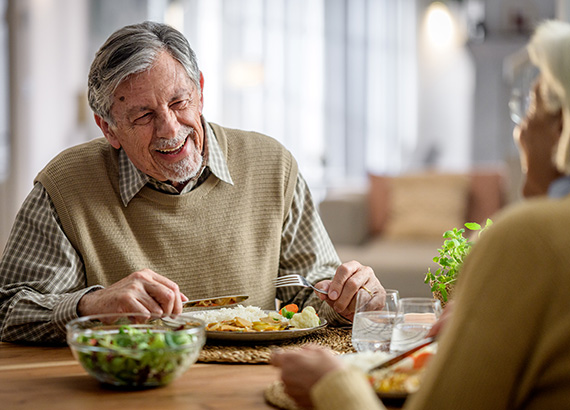Healthy Eating as You Age: Part One

Eating well as you age can play a crucial role in maintaining health and vitality. While many people aim to eat healthily throughout life, various circumstances - such as budget constraints, busy schedules, or fast-food cravings - can make this challenging. In today’s world, processed and fast foods are more common than ever, but nutritious meals can make a real difference, especially in our later years.
At Vermont Aged Care, we understand how essential good nutrition is for seniors. We ensure our residents enjoy well-balanced meals without missing out on the occasional treat. We know caring for an elderly loved one can be challenging, and we’re here to help with valuable nutrition tips to support their health and well-being.
Basic Facts About Nutrition for Seniors
According to dietary experts, there are five primary food groups essential for good health:
- Vegetables – A variety of colors and types, including legumes and beans.
- Fruits – Fresh, frozen, or canned without added sugar.
- Grains – Whole grains and high-fiber cereals like rice, pasta, oats, and barley.
- Proteins – Lean meats, poultry, fish, eggs, tofu, nuts, seeds, and beans.
- Dairy – Milk, yogurt, cheese, or alternatives for calcium and other nutrients.
A well-rounded diet featuring these groups supports overall health and vitality, though factors like health issues, budget, and food preferences may affect food choices. Find out more about these food groups here: Five Food Groups.
Tips for Grocery Shopping and Saving on Food Costs
Planning meals and making a shopping list before heading to the store can help reduce costs and avoid waste. For example, if a recipe calls for carrots, only buy what you’ll need rather than excess. Meal planning ensures you’re buying just the right amount of each ingredient, saving both money and food.
Physical Activity and Energy Needs
As we age, our bodies typically need fewer kilojoules, or calories, but still require essential nutrients. Maintaining a healthy weight is important for seniors to avoid issues like joint strain or health complications. Even though they may need fewer calories, seniors still need nutrient-dense foods for muscle strength, a balanced weight, and stronger bones. Calcium-rich foods or supplements can help meet their needs.
Foods to Limit
It’s beneficial to reduce or limit certain foods and drinks for seniors, including those high in fats, salt, added sugars, and alcohol. These are often labeled as “discretionary” foods and should be enjoyed only occasionally. If your loved one enjoys an occasional glass of wine, it’s typically fine, but consulting their GP for personalised advice is wise, as individual needs vary.
For more information on foods to limit, visit: Fat, Salt, Sugars, and Alcohol.
Supporting Digestion and Regularity
As we age, digestion tends to slow down. Encouraging gentle physical activity, like a 15-20 minute walk, can support digestion. Seniors should also aim for high-fiber foods and stay hydrated to prevent constipation. Regular attention to these areas is especially important for elderly loved ones.
In Conclusion
Supporting your elderly loved one’s health with balanced nutrition can make a meaningful difference in their quality of life. We hope these tips help make it easier to provide nutritious and satisfying meals. Stay tuned for the next post in our Healthy Eating as You Age series, where we’ll continue to share tips for senior nutrition.
Recommended Reading:
Please note, this blog is intended for general advice. For tailored guidance, consult your GP, or contact Vermont Aged Care for professional advice and support for residential aged care.

